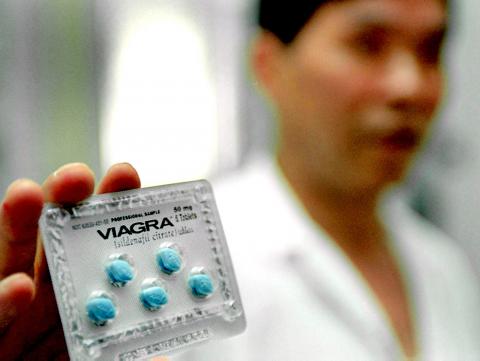Twenty years ago, a little blue pill called Viagra unleashed a cultural shift in America, making sex possible again for millions of older men and bringing the once-taboo topic of impotence into daily conversation.
While the sexual improvement revolution it sparked brightened up the sex lives of many couples, it largely left out women still struggling with dysfunction and loss of libido over time. They have yet to benefit from a magic bullet to bring it all back, experts say.
About 65 million prescriptions have been filled worldwide for the blockbuster Pfizer drug approved by the US Food and Drug Administration on March 27, 1998.

Photo: AFP
It was the first pill aimed at helping men get erections.
Suddenly, talk of an amazing drug that could make an older man’s penis hard again was all over television and magazines.
The Viagra boom also coincided with the rise of the internet, and the explosion of online pornography.

Photo: AFP
Ads for Viagra were designed to reframe what had been known as “male impotence” as “erectile dysfunction” or ED, a medical condition that could finally be fixed.
Republican senator, military veteran and one-time presidential candidate Bob Dole became the first television spokesman for Viagra, admitting his own fears about erectile dysfunction to the masses. “It’s a little embarrassing to talk about ED, but it is so important for millions of men and their partners,” he said. The strategy worked.
Before Viagra, men wanted to talk about their erectile problems, and did, but the conversations were awkward and difficult, recalled Elizabeth Kavaler, a urology specialist at Lenox Hill Hospital in New York.
“Now, sexuality in general is very out there,” she added.
“Sex has become an expected part of our lives as we age. And I am sure Viagra has been a big part of that.”
‘THANKS, VIAGRA’
Viagra has had a “major impact” — on a par with the way antibiotics changed the way infections are treated, and how statins became ubiquitous in the fight against heart disease, said Louis Kavoussi, chairman of urology at Northwell Health, a New York-area hospital network.
Viagra’s release also came amid a “sort of a clampdown on physicians interacting with companies,” he said.
“So this was a perfect medicine to advertise to consumers. It was a lifestyle type of medicine.”
Viagra, or sildenafil citrate, was first developed as a drug meant to treat high blood pressure and angina. But by 1990, men who took part in early clinical trials discovered its main effect was improving their erections, by boosting blood flow to the penis.
For all its popularity, Viagra is still often misunderstood.
“It isn’t an aphrodisiac,” said Kavoussi.
“A lot of men who ask about it say, ‘My wife isn’t very interested in relations,’” he added.
“And I say, ‘Viagra is not going to change that.’”
In 2000, the comedy show Saturday Night Live featured a spoof on ads that showed sexually satisfied men saying, “Thanks, Viagra.”
In it, one eye-rolling actress after another was featured groaning “Thanks, Viagra,” as a horny male partner groped her from behind or gripped her in a slow-dance.
The skit was funny because it reflected a reality few people were talking about.
“We are a very puritanical society, and I think Viagra has loosened us up,” said Nachum Katlowitz, director of urology and fertility at Staten Island University Hospital. “But for the most part, the women have been left out of the sexual improvement revolution.”
Pfizer finally did include women in its marketing for Viagra, in 2014. The commercials featured sultry women, including at least one with a foreign accent, speaking directly to the camera, telling men to get themselves a prescription.
‘FEMALE VIAGRA’ FLOPS
In 2015, the FDA approved a pill called Addyi (flibanserin), which was cast in the media as the “female Viagra,” and was touted as the first libido-enhancing pill for women who experienced a loss of interest in sex.
The pill was controversial from the start. A kind of anti-depressant, women were warned not to drink alcohol with it. It also cost hundreds of dollars and came with the risk of major side effects like nausea, vomiting and thoughts of suicide.
“It didn’t go over too big,” said Katlowitz.
Valeant Pharmaceuticals bought Addyi for US$1 billion in 2015, but sold it back to the developer, Sprout Pharmaceuticals, at a steep discount last year.
Older women’s main problem when it comes to sex is vaginal dryness that accompanies menopause, and can make sex painful. Solutions tend to include hormones, or laser treatments that revitalize the vagina. They are just beginning to grow in popularity, but still cost hundreds to thousands of dollars, said Kavaler.
“We are at least 20 years behind men,” she said.
For Katlowitz, Viagra was a prime example of “the greed of the pharmaceutical industry.”
Viagra cost about US$15 per pill when it first came out, and rose to more than US$50. It finally went generic last year, lowering the price per pill to less than US$1.
“There was absolutely no reason to charge US$50 a pill,” said Katlowitz. “It was just that they could, so they did.”

June 9 to June 15 A photo of two men riding trendy high-wheel Penny-Farthing bicycles past a Qing Dynasty gate aptly captures the essence of Taipei in 1897 — a newly colonized city on the cusp of great change. The Japanese began making significant modifications to the cityscape in 1899, tearing down Qing-era structures, widening boulevards and installing Western-style infrastructure and buildings. The photographer, Minosuke Imamura, only spent a year in Taiwan as a cartographer for the governor-general’s office, but he left behind a treasure trove of 130 images showing life at the onset of Japanese rule, spanning July 1897 to

In an interview posted online by United Daily News (UDN) on May 26, current Chinese Nationalist Party (KMT) Chairman Eric Chu (朱立倫) was asked about Taichung Mayor Lu Shiow-yen (盧秀燕) replacing him as party chair. Though not yet officially running, by the customs of Taiwan politics, Lu has been signalling she is both running for party chair and to be the party’s 2028 presidential candidate. She told an international media outlet that she was considering a run. She also gave a speech in Keelung on national priorities and foreign affairs. For details, see the May 23 edition of this column,

One of the most important gripes that Taiwanese have about the Democratic Progressive Party (DPP) is that it has failed to deliver concretely on higher wages, housing prices and other bread-and-butter issues. The parallel complaint is that the DPP cares only about glamor issues, such as removing markers of Chinese Nationalist Party (KMT) colonialism by renaming them, or what the KMT codes as “de-Sinification.” Once again, as a critical election looms, the DPP is presenting evidence for that charge. The KMT was quick to jump on the recent proposal of the Ministry of the Interior (MOI) to rename roads that symbolize

Jade Mountain (玉山) — Taiwan’s highest peak — is the ultimate goal for those attempting a through-hike of the Mountains to Sea National Greenway (山海圳國家綠道), and that’s precisely where we’re headed in this final installment of a quartet of articles covering the Greenway. Picking up the trail at the Tsou tribal villages of Dabang and Tefuye, it’s worth stocking up on provisions before setting off, since — aside from the scant offerings available on the mountain’s Dongpu Lodge (東埔山莊) and Paiyun Lodge’s (排雲山莊) meal service — there’s nowhere to get food from here on out. TEFUYE HISTORIC TRAIL The journey recommences with